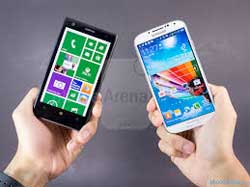
Subscribe & Follow
Jobs
- Full Stack C# Developer Pretoria
- Data Analyst Johannesburg
Nokia, Microsoft never the twain

The man, an early investor, hadn't noticed that this small Finnish company, renowned for its rubber boots and its cables, was also a cellphone giant.
Nokia is now a business unit inside Microsoft, after the US$7,5bn purchase was concluded last week. It's a good match as Nokia is left to recover from its previous management's failure to adapt to market changes after Apple's iPhone swept the world.
Such corporate arrogance was exceeded only by those who ran BlackBerry into the ground. They missed the shift to better touchscreens over keypads and failed to understand that BlackBerry's strength was its secure, efficient e-mail delivery system, not its sub-standard smartphones with crappy browsers.
Twenty years ago, the cellphone industry was in its infancy. Microsoft made desktop and laptop computers. As the industry developed, Microsoft and Nokia squared off in the fight for enterprise customers. They would develop into cut-throat competitors.
Nokia starts ailing
Then, in 2009, they surprisingly announced Microsoft Office would be coming to Nokia handsets. The reason? Google. And Google Docs, those saved-in-the-cloud, access-off-any-device documents that would replace the storage of the desktop computing era. This alliance was to grow into the merger we see today.
The head of Microsoft Business Division in 2009 was one Stephen Elop, later called in to save a "burning platform", as he described Nokia's outdated Symbian software when he became its chief executive in 2011. Elop spent three years trying to save the former giant, haemorrhaging money and jobs, which had held 40% of market share in 2008.
Seeing the strength of Google's Android and realising they couldn't compete against the bigger marketing muscle of some of its manufacturers, Elop opted for Microsoft's then new Windows Phone software. It is a superb operating system, superior to previous efforts. Unfortunately consumers don't seem to have noticed.
Microsoft's global market share, chiefly via Nokia handsets, is about 3%. It's a distant third to Android and Apple's iOS, which account for all the profit from the smartphone market.
Apple, Samsung dominate
Apple reaps two-thirds and Samsung the rest, leaving nothing much for the other manufacturers, according to a recent report by Tavis McCourt, an analyst at Raymond James.
"Apple and Samsung continue to soak up all the industry's profits. Apple claimed 87,4% of phone earnings before interest and taxes in the fourth quarter. Samsung took in 32,2%. Because their combined earnings were higher than the industry's total earnings as a result of many vendors losing money in the fourth quarter, Apple and Samsung mathematically accounted for more than 100% of the industry's earnings."
Some analysts have called the deal a bail-out for Nokia, others think the tie-up with Microsoft is what both monopolists need: the parts of their rival they never really achieved in-house.
Nokia's Lumia phones are arguably the most beautifully designed smartphones, the equivalent of a digital pebble to hold in your hand and marvel at how the waves formed it so perfectly.
The top-end Lumia 1020 giga-monster (with a 41-megapixel camera) takes the best mobile phone pictures bar none. But it competes against the mythologies of the iPhone, as well as Samsung's Galaxy and Sony's Xperia; and that market is saturated. The mid-range Asha line, which Nokia says blends a smartphone experience with a less-powerful phone, has been great for Nokia's market share, not so much for its profits because of the cut-throat margins.
The bad news for Elop, now head of Microsoft's mobile division, is that McCourt warns: "After four straight years of double-digit growth, the mobile phone market has hit a wall. Excluding Chinese vendors, the industry is likely to see little or no revenue growth this year."
China's Huawei, Lenovo and ZTE are the next Nokias.
Source: I-Net Bridge

For more than two decades, I-Net Bridge has been one of South Africa’s preferred electronic providers of innovative solutions, data of the highest calibre, reliable platforms and excellent supporting systems. Our products include workstations, web applications and data feeds packaged with in-depth news and powerful analytical tools empowering clients to make meaningful decisions.
We pride ourselves on our wide variety of in-house skills, encompassing multiple platforms and applications. These skills enable us to not only function as a first class facility, but also design, implement and support all our client needs at a level that confirms I-Net Bridge a leader in its field.
Go to: http://www.inet.co.za















